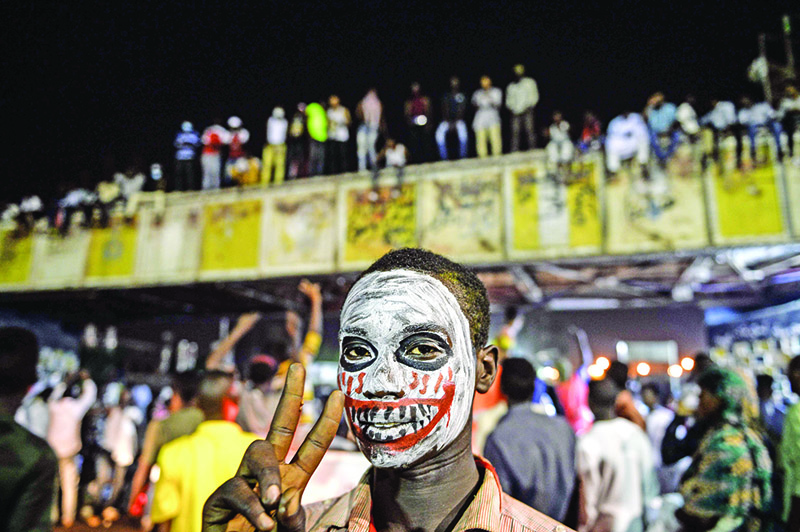

KHARTOUM: Sudan'sarmy rulers and protesters are to resume talks over handing power to a civilianadministration, protest leaders said yesterday, a month after veteran presidentOmar al-Bashir was deposed. The Alliance for Freedom and Change - an umbrellafor the protest movement - said the generals had invited it for a new round oftalks after several days of deadlock.
The apparentinvitation to fresh talks came as thousands of protesters remain camped outsidearmy headquarters in central Khartoum, vowing to force the ruling militarycouncil to cede power - just as they forced Bashir from office exactly a monthago. "We received a call from the military council to resume negotiations,"the Alliance for Freedom and Change said in a statement.
Late last month,the alliance, which brings together protest organizers, opposition parties andrebel groups, handed the generals its proposals for a civilian-led transitionalgovernment. But the generals have pointed to what they call "manyreservations" over the alliance's roadmap. They have singled out itssilence on the constitutional position of Islamic sharia law, which was theguiding principle of all legislation under Bashir's rule but is anathema tosecular groups like the Sudanese Communist Party and some rebel factions in thealliance.
"We want tohold the talks quickly and sort out all these points in 72 hours," thealliance said without specifying when the negotiations would resume. Protestersremain determined to achieve their goal. "We want civilian rule or we willstay here forever," said Iman Hussein, a regular at the sit-in outside thearmy complex which protesters have kept up since April 6.
Winner 'will beus'
Protestersinitially gathered at the army complex to seek the generals' help in endingBashir's three decades of iron-fisted rule. On April 11, the army toppledBashir in a palace coup replacing him with a military council formed entirelyof generals that has so far stymied protesters' dreams of a civilian-ledtransition to democracy. A deepening economic crisis that fuelled the fourmonths of nationwide protests which led to Bashir's ouster shows no sign ofabating.
Huge queues formdaily at ATM machines. Basic goods have become ever more costly, due to thesliding value of the Sudanese pound. The generals insist they will not useforce to disperse the sit-in, which protesters have kept up even during daytimefasts for the holy month of Ramadan. The generals have offered severalconcessions to placate the protesters, including detaining Bashir in Khartoum'sKober prison, arresting several of his lieutenants and promising to prosecuteofficers who killed protesters during the last days of the former president'srule.
But when it comesto the protesters' key demand for a civilian authority to oversee a four-yeartransition, the military has simply dragged its heels. "They arepressuring us with time, but we are pressuring them with our presencehere," said protester Hussein. "One of us has to win in the end, andit will be us."
'Escalatorymeasures'
The protestmovement says the military appears intent on hijacking the revolution anddetermining its outcome. Protest leader Khalid Omar Yousef told reporters onWednesday that the movement was now considering "escalatory measures"like launching a nationwide civil disobedience movement to achieve its demand.The generals are under pressure too, with the United States and the AfricanUnion calling on them to ensure a smooth transition of power.
In a telephonecall with military council chairman General Abdel Fattah al-Burhan, US DeputySecretary of State John Sullivan backed "the Sudanese people's aspirationsfor a free, democratic and prosperous future". The State Department saidSullivan encouraged Burhan to reach agreement with the Alliance for Freedom andChange and "move expeditiously toward a civilian-led interimgovernment", during a phone call on Wednesday.
But the generalshave strong support from oil-rich Saudi Arabia and the United Arab Emirates,which have extended a $3 billion credit line to shore up the Sudanese pound andfund imports of basic goods. Some members of the protest movement areoptimistic that the generals will ultimately cede power. "Because theyknow if ultimately they settle for a military dictatorship, they will be in thesame position as Bashir," opposition leader Sadiq Al-Mahdi, the primeminister Bashir overthrew in an Islamist-backed coup in 1989, told AFP earlierthis month. - AFP

